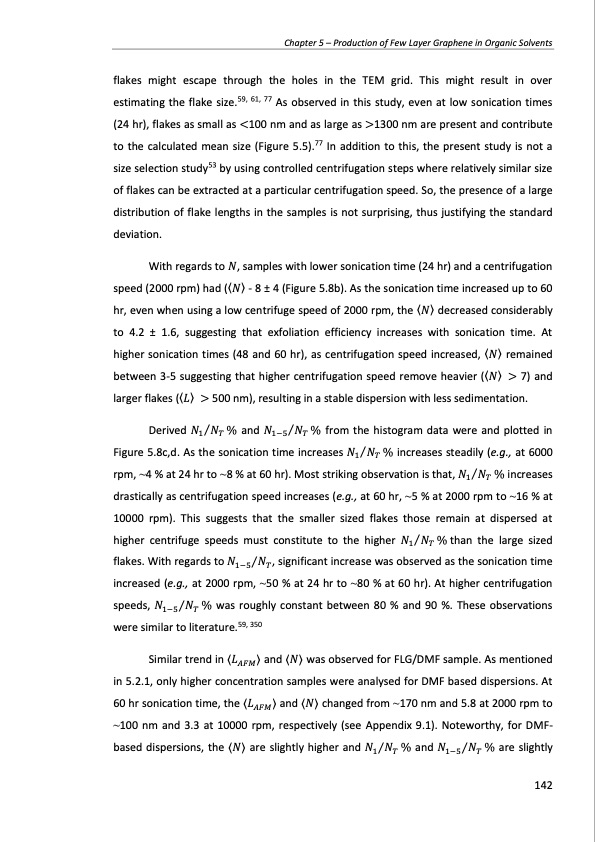
PDF Publication Title:
Text from PDF Page: 142
Chapter 5 – Production of Few Layer Graphene in Organic Solvents flakes might escape through the holes in the TEM grid. This might result in over estimating the flake size.59, 61, 77 As observed in this study, even at low sonication times (24 hr), flakes as small as <100 nm and as large as >1300 nm are present and contribute to the calculated mean size (Figure 5.5).77 In addition to this, the present study is not a size selection study53 by using controlled centrifugation steps where relatively similar size of flakes can be extracted at a particular centrifugation speed. So, the presence of a large distribution of flake lengths in the samples is not surprising, thus justifying the standard deviation. With regards to 𝑁, samples with lower sonication time (24 hr) and a centrifugation speed (2000 rpm) had (〈𝑁〉 - 8 ± 4 (Figure 5.8b). As the sonication time increased up to 60 hr, even when using a low centrifuge speed of 2000 rpm, the 〈𝑁〉 decreased considerably to 4.2 ± 1.6, suggesting that exfoliation efficiency increases with sonication time. At higher sonication times (48 and 60 hr), as centrifugation speed increased, 〈𝑁〉 remained between 3-5 suggesting that higher centrifugation speed remove heavier (〈𝑁〉 > 7) and larger flakes (〈𝐿〉 > 500 nm), resulting in a stable dispersion with less sedimentation. Derived 𝑁1⁄𝑁𝑇 % and 𝑁1−5⁄𝑁𝑇 % from the histogram data were and plotted in Figure 5.8c,d. As the sonication time increases 𝑁1⁄𝑁𝑇 % increases steadily (e.g., at 6000 rpm, ~4 % at 24 hr to ~8 % at 60 hr). Most striking observation is that, 𝑁1⁄𝑁𝑇 % increases drastically as centrifugation speed increases (e.g., at 60 hr, ~5 % at 2000 rpm to ~16 % at 10000 rpm). This suggests that the smaller sized flakes those remain at dispersed at higher centrifuge speeds must constitute to the higher 𝑁1⁄𝑁𝑇 % than the large sized flakes. With regards to 𝑁1−5⁄𝑁𝑇, significant increase was observed as the sonication time increased (e.g., at 2000 rpm, ~50 % at 24 hr to ~80 % at 60 hr). At higher centrifugation speeds, 𝑁1−5⁄𝑁𝑇 % was roughly constant between 80 % and 90 %. These observations were similar to literature.59, 350 Similar trend in 〈𝐿𝐴𝐹𝑀〉 and 〈𝑁〉 was observed for FLG/DMF sample. As mentioned in 5.2.1, only higher concentration samples were analysed for DMF based dispersions. At 60 hr sonication time, the 〈𝐿𝐴𝐹𝑀〉 and 〈𝑁〉 changed from ~170 nm and 5.8 at 2000 rpm to ~100 nm and 3.3 at 10000 rpm, respectively (see Appendix 9.1). Noteworthy, for DMF- based dispersions, the 〈𝑁〉 are slightly higher and 𝑁1⁄𝑁𝑇 % and 𝑁1−5⁄𝑁𝑇 % are slightly 142PDF Image | PRODUCTION AND APPLICATIONS OF GRAPHENE AND ITS COMPOSITES

PDF Search Title:
PRODUCTION AND APPLICATIONS OF GRAPHENE AND ITS COMPOSITESOriginal File Name Searched:
graphene-production-applications.PDFDIY PDF Search: Google It | Yahoo | Bing
Salgenx Redox Flow Battery Technology: Power up your energy storage game with Salgenx Salt Water Battery. With its advanced technology, the flow battery provides reliable, scalable, and sustainable energy storage for utility-scale projects. Upgrade to a Salgenx flow battery today and take control of your energy future.
| CONTACT TEL: 608-238-6001 Email: greg@infinityturbine.com | RSS | AMP |